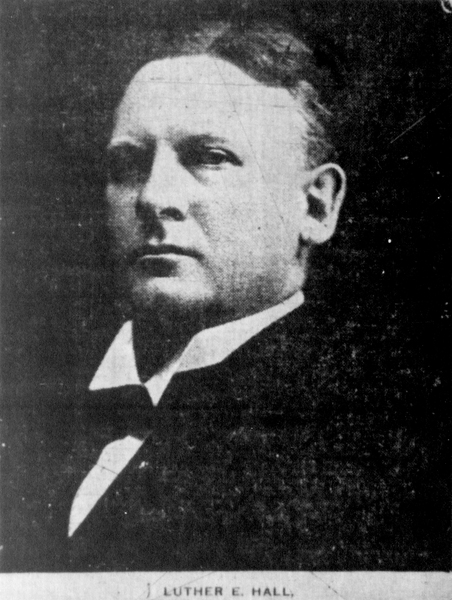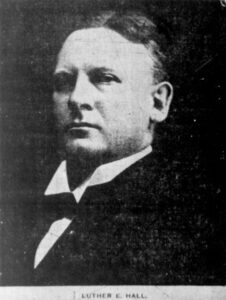Luther Hall
Before becoming governor of Louisiana, a position he held from 1912 until 1916, Luther Hall served as a state senator, a district judge, and a state appellate court judge.

Courtesy of State Library of Louisiana
Governor of Louisiana Luther Egbert Hall in 1912. Unidentified
Before becoming governor of Louisiana, a position he held from 1912 until 1916, Luther Hall served as a state senator (1898-1900), a district judge (1900-1906), and a state appellate court judge (1906-1911). Hall ran for the governorship at the urging of reformer John Parker, leader of the New Orleans Good Government League, who saw Hall as a strong reform candidate. Though Hall’s administration undertook a number of reforms, it failed to bring about the broad-scale improvements that many voters desired.
Luther Egbert Hall was born in Bastrop (in Morehouse Parish) on August 30, 1869, the son of Bolling Cass Hall, a planter, and Antoinette Newton Hall. After attending local schools and graduating from Washington and Lee University in 1889, he went on to earn a law degree from Tulane University in 1892. He practiced law briefly in Alexandria and Bastrop before voters elected him to the state senate in 1898. He went on to spend six years as a judge in the Sixth Judicial District and another five in the Northern District court of appeals.
Though Hall won a seat on the Louisiana State Supreme Court, John Parker persuaded him to resign that position and campaign for governor in 1911. Parker’s Good Government League opposed New Orleans Mayor Martin Behrman and his supporters in the Regular Democratic Organization (commonly known as the “Old Regulars” or “The Ring”), a powerful and allegedly corrupt political coalition. Parker correctly intuited that Hall’s judicial background would make him a strong reform candidate. In the Democratic primary, Hall defeated John T. Michel and James B. Aswell tantamount, at that time, to winning the election.
During his term Hall supported reform efforts such as the non-partisan short ballot and a recall law to facilitate the removal of corrupt officials. He also helped make Louisiana the first Southern state to enact a workman’s compensation law in 1914 and secured legislative approval for a commission form of government in New Orleans. His efforts, however, constantly met with resistance from the conservative New Orleans political machine, particularly once Behrman won re-election in 1912. Voters rejected Hall’s call for a state constitutional convention to unravel confusion about bonded debt, as well his efforts to raise property taxes to improve state services.
After leaving office, Hall returned to the judicial branch of government. From 1916 to 1917 he practiced law in New Orleans and then served as assistant attorney general in 1918. Hall was defeated in his bid for the US Senate in 1918 and again in 1920 when he campaigned for the state supreme court. Just before his death on November 6, 1921, he was trying to have the latter defeat reversed because of a legal technicality involving his opponent’s qualifications. He is interred in Bastrop Cemetery.
Adapted from Matthew J. Schott’s entry for the Dictionary of Louisiana Biography, a publication of the Louisiana Historical Association in cooperation with the Center for Louisiana Studies at the University of Louisiana, Lafayette.
Sources: Matthew Schott; Walter J. Burke, “Luther E. Hall,” Louisiana Historical Quarterly, VI (1923); Matthew J. Schott, “John M. Parker and the Varieties of American Progressivism” (Ph. D. dissertation, Vanderbilt University, 1969); obituary, New Orleans Times-Picayune, November 7, 1921. http://www.lahistory.org
